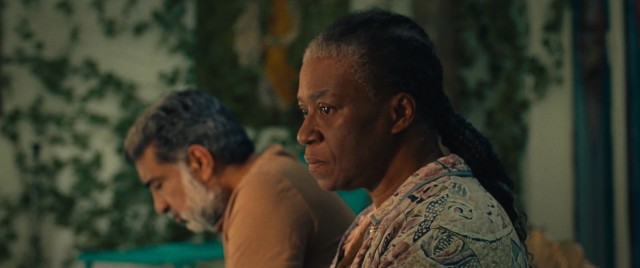The reigning BAFTA-winner, and an audience award-winner at Encounters and Seattle, Jellyfish and Lobster, Yasmin Afifi’s acclaimed student film out of the UK’s National Film & Television School, doesn’t need my validation. More than any British short film of the past year, it has been vetted by and has received the blessings of the crowd.
Yet, I won’t complain if you tell me that those things are precisely why you want my validation. Like any other popular art, Short Film has a populist/critical divide, and we proudly plant a flag in the elitist camp. With that distinction made, the basic description of this film does raise all sorts of alarm bells for a particular form of saccharine sentimentality that makes people cry and therefore gets wildly overpraised on the way to winning awards. To list some: old people, love, cancer, dementia, cute costumes, magical realism, a rediscovery of what makes life worth living—I could go on. Jellyfish and Lobster will make you cry. I did! That’s part of its job. But that can be manipulative and cheap in a distilled form. What prevents this film from falling into that trap? Ladies and gentlemen—it is absolutely FILTHY.

Flo Wilson (R) stars as Grace in Jellyfish and Lobster
“Stanley Coochie” has become something of a meme online and it’s just one of the gnarly and funny elements in the short. The film’s depiction of elder sex is not raw, but it is at least frank, and shorn of cutesy euphemisms. Grace (Flo Wilson) is a crotchety, raunchy old lady dying of cancer and the charisma of the performance as well as wild moments in Afifi’s script make her a supremely original and memorable character. This is a lady who snaps a photo of her privates to send her son! Who diarrheas on her love interest due to her chemo! The audacity of the film’s vulgarity could be argued as a fig leaf to cover up its fundamental normcore nature, but instead I feel strongly that it is an inspired complement, one that balances the stew of the film where the flavor might otherwise tilt too sweet.
“The only way I felt I could both survive and process the pain was by reconstructing it into something beautiful”
Grace does have cancer. Her love interest at the old folks home suffers from dementia, and while not the main focus of the film, Afifi is not forgetful of these facts. They are integral to the inspiration for the film, as the filmmaker related to us over email, “The idea came about after my aunt, who had been a second mum to me my whole life was diagnosed with an aggressive form of brain cancer. This came after already losing my Dad to cancer not long before then. And the only way I felt I could both survive and process the pain was by reconstructing it into something beautiful.” This personal connection to loss is directly expressed in the credits, with a dedication to 17 individuals lost by the cast and crew to the disease.
Ultimately, Jellyfish and Lobster is not a film directly tuned to my tastes but, from the wonderful performances of Wilson and Sayed Badreya, to the delicious photography by Linda Wu (I also really dig the color-job by Vanessa Aparicio) to the punchy and clever one-liners from Afifi’s pen, this is a class production through and through, at a level that is rare in shorts period, and especially from a student short. Afifi is currently developing her feature debut with the BBC and that is no surprise. And yes, the film is sincere. And it shoots for a sort of “life is beautiful” uplift. And it will try and make you cry. But it’s not wrong to be sincere. Afifi writes, “ I hope people walk away from it, understanding the brevity of life is what gives it its magic. And also that growing old is beautiful and a gift.” Too trite? I don’t think so. Importantly, the film does not ignore the price of life which is death, and the vulgarity I praised is illustrative of why that price is ok. It’s a lovely film that I admire a lot and we’re proud to support its online premiere this award season as it attempts an unprecedented transatlantic awards double this Oscar season.

 Jason Sondhi
Jason Sondhi